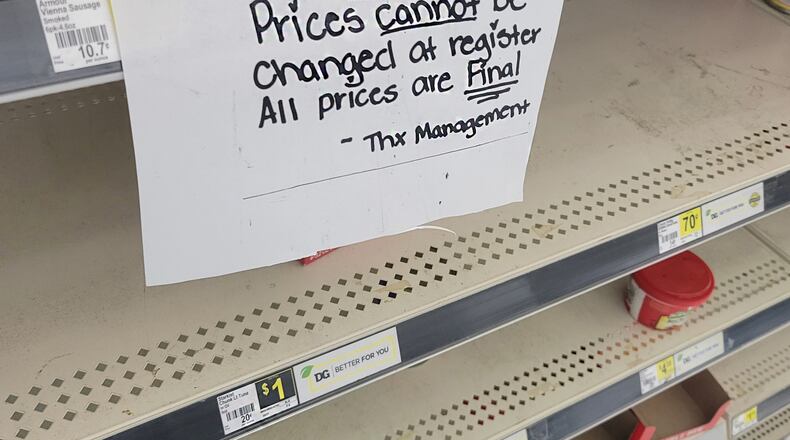“Everything we buy these days costs more — Ohioans can ill-afford businesses that draw people in with the promise of low prices only to deceive them at the checkout counter,” Yost said. “This seems like a company trying to make an extra buck and hoping no one will notice. We’ve not only noticed but are taking action to stop it.”
Butler County Auditor Roger Reynolds told the Journal-News his office was notified by 73-year-old St. Clair Twp. resident William Anderson the prices on the shelves at the Dollar General at 950 S. Main St. in Hamilton and the amount cashed out didn’t match. It is the auditor’s job to test commercial devises like gas pumps and store scanners.
After that his office began conducting price verification checks at all the county Dollar General stores on Oct. 14. The results have shown double-digit error rates up to 88%. A store is allowed only a plus or minus 2% error rate.
Anderson told the Journal-News on Wednesday after Yost filed the lawsuit he is proud of being a whistleblower.
“I’m glad I did, I wanted to make sure people pay the lowest price for stuff they’re getting on the shelf...,” Anderson said. “I feel like I’m the one who let the cat out of the bag, Pandora’s box, what can of worms did I open up.”
Reynolds would not comment on Yost’s lawsuit.
Anderson, in his letter to the auditor, noted that the store had a sign posted by the management that read “Prices cannot be changed at the register. All prices are final.” He stated, “That is dishonest — as the shelf price may say two boxes of cereal for $6.00 but when I get to the register it’s $7.00 or higher! Can’t they use the price on the shelf — or at least change them every week?”
Yost’s office is reporting from March 2021 to August 2022, they received 12 complaints detailing similar “unfair and deceptive practices” by Dollar General stores in Cuyahoga, Franklin, Highland, Lucas, Madison, Richland, Summit and Trumbull counties.
His office wouldn’t confirm it but presumably with a total of 32 violations Dollar General could be on the hook for $800,000 if the court finds the retailer culpable, plus restitution for shoppers who were harmed and court costs. The suit also asks the court, if it finds in favor of Yost to prohibit Dollar General “from engaging in business as a supplier in any consumer transaction in Ohio” until it “has satisfied all monetary obligations.”
The auditor’s Office Weights and Measures Department ensures that the labeled shelf price or the advertised price matches the price charged at the checkout. A store is allowed a plus or minus 2% error rate. The 2% is calculated on the total number of items tested. If 50 items are scanned, the store can only have one item scan incorrectly.
The highest number of erroneous price checks were at the Hamilton Eaton Road store in Hamilton where 17 items were checked and 15 had different prices for an 88.2% fail rate.
At most of the stores, a consistent error was found with products advertised for a lesser price if two or three or more of the products were purchased. The reduced price was not reflected at checkout. In some instances, managers said they would enter the correct advertised price if a customer complained.
At one store, on College Corner Pike in Oxford all the pricing errors were in the customers’ favor.
This has happened elsewhere nationwide. In 2019 Dollar General reached a $1.75 million settlement with the state of Vermont for violating the state’s Consumer Protection Act, according to a release from Vermont’s Attorney General’s Office. Dollar General resolved claims that it sold products that were advertised on the shelf at a lower price than the price at the register, even after being told at least 50 times by state inspectors to correct the pricing inaccuracies.
The Journal-News reached out to Dollar General again, but no one responded.
Dollar General, a Tennessee-based company specializing in household goods, has operated in Ohio since 2015, Yost’s office said. It has 943 stores statewide.
About the Author

